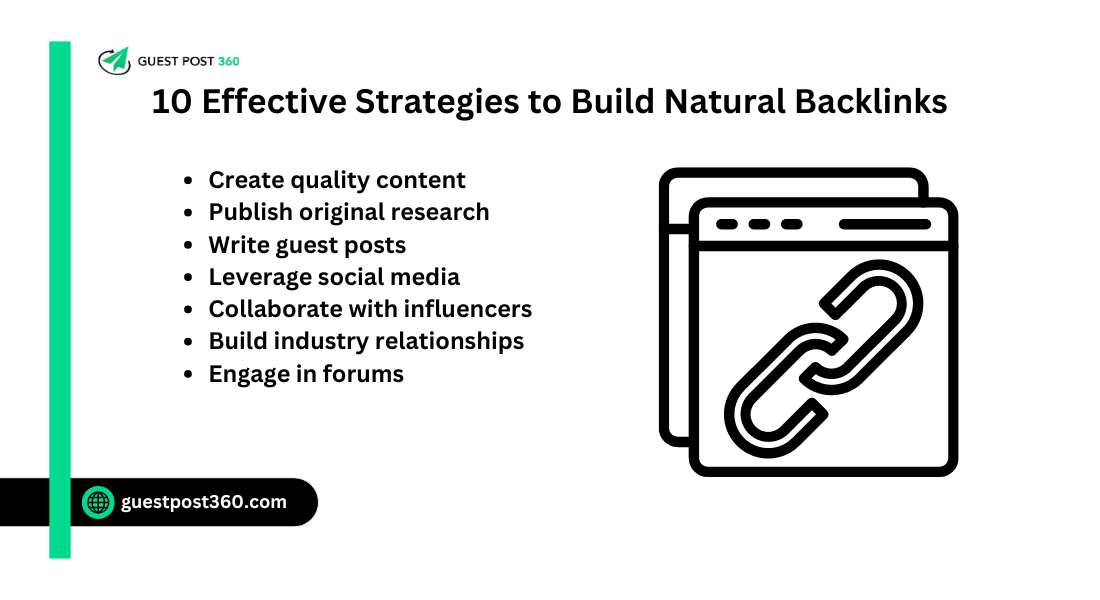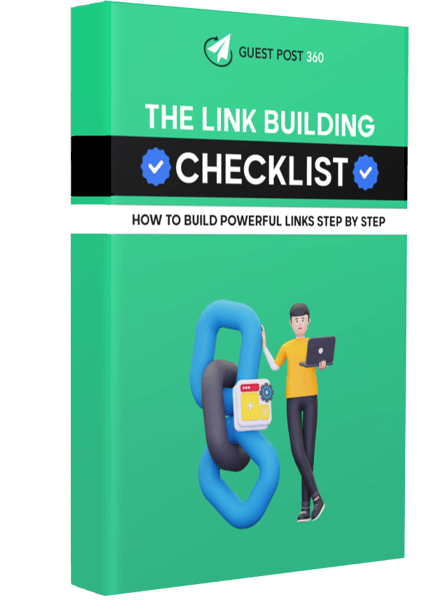Building natural backlinks is one of the most effective ways to improve your website’s SEO while staying in line with search engine guidelines. Unlike paid or forced links, natural backlinks occur when other websites find your content valuable and link to it organically. These types of links signal to search engines that your content is credible, which can boost your site’s ranking. By focusing on producing high-quality content and fostering relationships with other industry professionals, you can encourage natural backlinks without risking penalties.
To build natural backlinks, it’s essential to focus on creating shareable and informative content that resonates with your target audience. Articles, infographics, and research studies tend to attract more organic links because they provide value to readers. In addition, promoting your content through social media, guest posts, and collaborations with influencers can help increase your visibility, leading to more opportunities for natural backlinks. The key is to be patient, as developing a strong
Table of Contents
ToggleWhat are natural backlinks?
Natural backlinks are links that other websites give to your content without any solicitation or payment. They are considered the most valuable type of backlink because they occur organically when someone finds your content valuable and worthy of sharing. These links can happen naturally when a website references your blog post, article, or resource because it adds value to their own audience. Search engines prioritize natural backlinks because they indicate that your content is trustworthy, relevant, and authoritative.
The reason why natural backlinks are so important is that they align with search engine guidelines and reflect genuine recommendations from other websites. They are a sign of credibility in the eyes of search engines like Google, which reward sites with more organic links by improving their rankings. In contrast, paid or forced backlinks can lead to penalties or reduced visibility if search engines detect manipulative link-building practices. Building a strong profile of natural backlinks takes time, but it results in more stable, long-term SEO benefits.
How do natural backlinks improve SEO?
Natural backlinks play a significant role in boosting your website’s SEO by serving as votes of confidence from other websites. When reputable sites link to your content, search engines interpret these links as a signal that your page provides valuable and relevant information. This increases your chances of ranking higher in search engine results pages (SERPs), which leads to greater visibility and traffic. The more natural backlinks your site earns from authoritative sources, the stronger its domain authority becomes.
Search engines use natural backlinks as one of the main ranking factors because they are harder to manipulate. Unlike other forms of link-building, such as paid or reciprocal links, natural backlinks are viewed as more authentic and trustworthy. When several sites link to your content without being prompted, it shows that your content is useful across different platforms. This helps your website gain more visibility in competitive niches and boosts organic traffic.
Why are natural backlinks important?
Natural backlinks are essential for establishing your website’s authority and credibility in its niche. These organic links signal to search engines that your site offers valuable content that others are willing to link to without incentives. The quality of the sites linking to you also plays a significant role; backlinks from high-authority websites can dramatically boost your SEO efforts. By focusing on building natural backlinks, you create a foundation of trust that enhances your site’s visibility and ranking.
One of the key reasons natural backlinks are so important is that they offer long-term benefits. While manipulative link-building strategies may offer short-term gains, they come with risks, such as penalties from search engines. In contrast, natural backlinks provide sustainable SEO improvements, as they reflect genuine interest from other webmasters. As more credible sites link to you naturally, your site’s domain authority and trustworthiness grow, giving you an edge over competitors.
How to attract natural backlinks?
To attract natural backlinks, focus on creating high-quality, shareable content that stands out in your industry. Content that offers unique insights, comprehensive guides, or helpful resources is more likely to earn organic links. You can also conduct original research, create engaging infographics, or publish case studies that other websites may want to reference. By consistently producing valuable content, you increase the chances that others will link to it naturally.
In addition, actively promoting your content can help you attract more natural backlinks. Sharing your content on social media, collaborating with influencers, and engaging with online communities in your niche can increase its visibility. The more exposure your content receives, the higher the likelihood that other sites will link to it. Remember, the key to building natural backlinks is patience and persistence. As long as your content provides value, it will eventually attract organic links over time.
Can content help gain natural backlinks?
Yes, content is one of the most powerful tools for gaining natural backlinks. High-quality, engaging, and informative content is more likely to be shared by others, increasing the chance that other websites will link back to it. Blog posts, infographics, case studies, and comprehensive guides are examples of content types that tend to earn natural backlinks because they offer valuable insights that other sites want to reference.
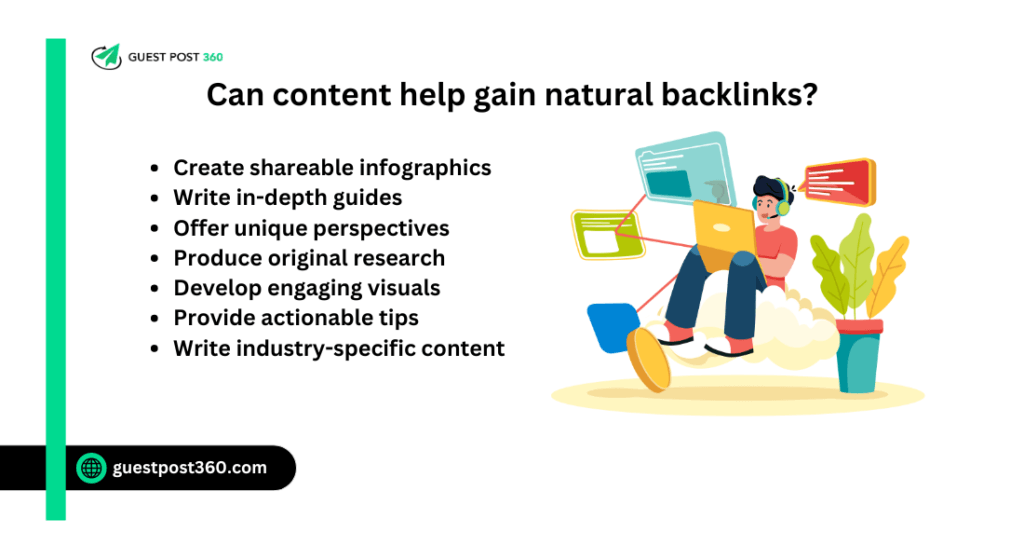

To increase the likelihood of earning natural backlinks through content, focus on originality and relevance. Unique content, such as exclusive research or innovative ideas, often attracts attention from other webmasters. Additionally, well-optimized content that answers popular questions or solves industry-specific problems is more likely to be linked by authoritative sources. By consistently publishing high-quality content, you can build a strong foundation of natural backlinks that support your SEO strategy.
What is the role of quality content in backlinks?
Quality content plays a crucial role in generating natural backlinks. Search engines and webmasters alike prioritize content that provides value, whether through informative articles, original research, or engaging visuals. The better your content, the more likely it is to attract links from other websites, as they recognize its usefulness to their own audiences. Quality content not only increases the chances of earning natural backlinks but also enhances the overall user experience on your site.
When you focus on producing high-quality content, you naturally encourage more natural backlinks. Other websites are more inclined to reference your work if they believe it offers unique insights or adds value to their own material. This is why creating in-depth, well-researched articles or resources is essential for building a strong backlink profile. Over time, consistently producing quality content will lead to a steady increase in natural backlinks, boosting your site’s authority.
How do influencers boost natural backlinks?
Influencers can play a significant role in boosting natural backlinks by promoting your content to a broader audience. When influencers in your industry share or link to your content, it gains visibility and credibility, increasing the likelihood that others will link to it as well. Since influencers often have large, engaged followings, their endorsement can generate a ripple effect, leading to more organic traffic and natural backlinks from other websites that discover your content.
Collaborating with influencers allows you to tap into their established networks and enhance your chances of gaining natural backlinks. When an influencer links to your content or mentions it in their own blog or social media, it signals to other webmasters that your content is worth referencing. This creates opportunities for organic link-building without needing to engage in direct outreach. Influencers can act as powerful amplifiers of your content, helping you build a strong profile of natural backlinks.
Do social shares create natural backlinks?
Social shares can indirectly lead to natural backlinks by increasing the visibility of your content. When your content is widely shared on social media platforms, it reaches a larger audience, including webmasters, bloggers, and content creators who may link to it in their own work. The more people see and engage with your content, the more opportunities you have to earn natural backlinks, as those who find it valuable may decide to link to it from their own websites.
While social media itself doesn’t provide direct SEO benefits, it serves as a powerful distribution channel for spreading your content. As your content gains traction through social shares, it becomes more likely to attract natural backlinks from other sources. To maximize the potential of social media for link-building, create shareable content that resonates with your audience and encourages engagement. Over time, these social signals can contribute to more natural backlinks, improving your overall SEO performance.
What content gets the most natural backlinks?
Content that is educational, unique, and engaging typically earns the most natural backlinks. Articles that provide in-depth knowledge, original research, or data-driven insights tend to be referenced by others because they offer substantial value. For instance, how-to guides, case studies, and detailed tutorials are often linked to because they answer specific questions or solve problems that many users may face. This makes them ideal content types for gaining natural backlinks.
In addition to research and guides, visual content like infographics and charts also attract a significant number of natural backlinks. Infographics, in particular, are easy to share and digest, making them perfect for webmasters looking for visual aids to complement their own content. When you create visually appealing and informative graphics, people are more likely to link back to your content, which boosts your backlink profile.
Another type of content that generates natural backlinks is long-form, authoritative articles. Long-form content is often seen as more valuable because it covers a topic in greater depth, making it a go-to resource for others who want to link to high-quality, comprehensive information. These articles not only drive traffic but also encourage other websites to link to them, further enhancing your site’s credibility through natural backlinks.
Lastly, interactive content like quizzes, tools, or calculators often earns natural backlinks because they engage users in ways static content doesn’t. By offering an interactive experience that is both valuable and shareable, you increase the likelihood of earning organic links from other websites, particularly if your tool provides solutions to industry-specific challenges or tasks.
How do guest posts generate natural backlinks?
Guest posting is one of the most effective strategies for earning natural backlinks. When you contribute high-quality content to reputable blogs or websites in your industry, you can include a link back to your own site. These guest posts not only help you reach a new audience but also allow you to build natural backlinks in a way that feels organic. The key is to offer valuable content that aligns with the host website’s readership, which increases the chances of your post being accepted and shared.
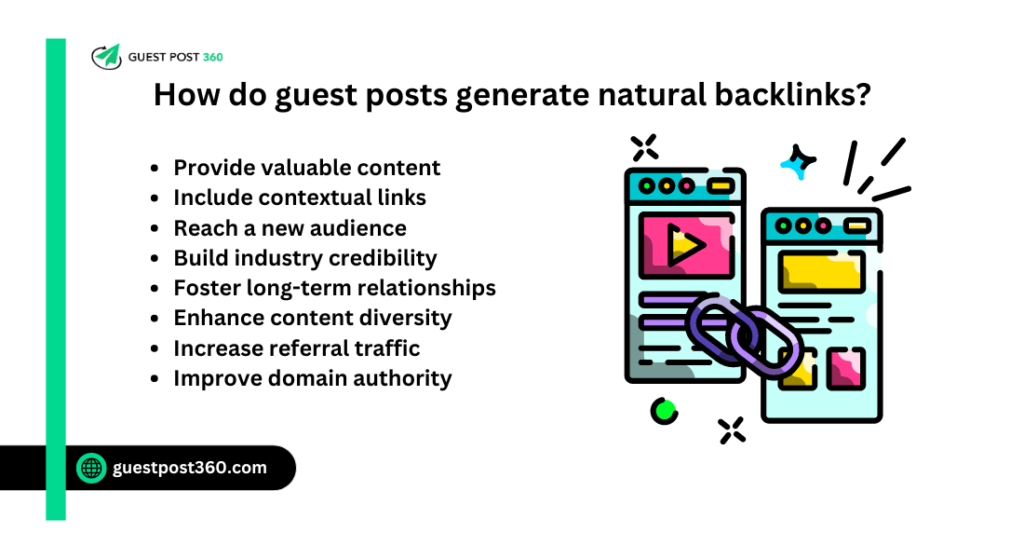

Another way guest posts generate natural backlinks is through visibility. When your guest post is published on a well-established blog, it introduces your content to a wider audience, many of whom may decide to link back to your site in their own content. This ripple effect helps to build a network of natural backlinks over time, as more people discover your work and consider it a resource worth linking to.
Guest posts are also valuable because they often come with editorial oversight from the host website. This ensures that your backlinks appear in a natural context, enhancing their credibility in the eyes of search engines. If your content is insightful and well-researched, it’s more likely that other sites will link back to it, further amplifying the natural backlink strategy.
Lastly, guest posts can lead to networking opportunities. By collaborating with other blogs and websites, you can build relationships with other content creators who might share and link to your work. This helps create a broader base of natural backlinks, as well as potential partnerships for future content collaborations, further enhancing your SEO efforts.
Are infographics good for natural backlinks?
Infographics are excellent tools for earning natural backlinks because they condense complex information into visually appealing, easy-to-digest graphics. Many webmasters and content creators are constantly searching for engaging visual content to complement their articles, and infographics provide exactly that. When your infographic offers valuable insights or data, it is more likely to be shared across various platforms, earning you natural backlinks in the process.
One of the reasons infographics work so well for building natural backlinks is their shareability. Infographics can easily be embedded in blog posts, social media, or presentations, making them highly versatile. When people embed your infographic, they often include a link back to your website as the original source. This creates an organic way to generate natural backlinks without needing to ask for them directly.
Infographics also stand out because they are highly engaging. Readers are more likely to spend time on your page and share the content if it is visually appealing. This can lead to more shares, visibility, and ultimately more natural backlinks from people who find your infographic valuable enough to include in their own content.
In addition, infographics often become evergreen content, meaning they continue to generate natural backlinks long after they’ve been published. As long as the information in the infographic remains relevant, other sites may continue to link to it over time, providing ongoing SEO benefits. Creating a high-quality, data-driven infographic can therefore be a great long-term strategy for earning natural backlinks.
How long does it take to build natural backlinks?
Building natural backlinks takes time, as the process depends on organic factors such as the quality of your content and its visibility. Unlike paid or reciprocal links, natural backlinks come as a result of others finding your content useful or authoritative enough to link to. This organic process is slower but more sustainable in the long run. Typically, it can take several months to start seeing the effects of your efforts, but once you do, the natural backlinks you acquire are usually more valuable and long-lasting.
The time it takes to build natural backlinks also depends on how well your content is promoted. Content promotion through social media, guest posts, and industry forums can help accelerate the process by putting your content in front of a larger audience. The more people who see and engage with your content, the more opportunities you have for other websites to link back to it naturally. However, it’s important to remain patient, as gaining natural backlinks requires consistent effort over time.
Another factor that influences the timeline is the competitiveness of your niche. In highly competitive industries, earning natural backlinks may take longer because more websites are vying for attention and visibility. On the other hand, if your content is unique and fills a gap in your industry, it may earn natural backlinks more quickly. In either case, focusing on creating high-quality, relevant content is key to building a strong backlink profile over time.
While the timeline for building natural backlinks can vary, it’s crucial to remain focused on long-term goals rather than short-term wins. Natural backlinks are valuable because they are earned, not bought or traded, and search engines reward this kind of organic link-building with better rankings. Patience and persistence are essential, but the result is a stronger and more credible website that ranks well for years to come.
What industries benefit most from natural backlinks?
Industries that rely heavily on informational content, such as education, healthcare, technology, and finance, tend to benefit the most from natural backlinks. In these fields, content like research reports, whitepapers, case studies, and how-to guides are frequently referenced by other sites. Since these industries often produce in-depth, authoritative content, they are more likely to earn natural backlinks as webmasters seek credible sources to link to in their own articles.
For example, the healthcare and medical industries thrive on well-researched content that is scientifically backed. Blogs and websites within these fields often link to reliable studies, articles, or data from authoritative health sources. As a result, websites that produce accurate and useful medical information can naturally gain a lot of natural backlinks. Similarly, the technology industry benefits from backlinks by sharing cutting-edge trends, innovations, and technical guides, all of which tend to attract links from various sources.
The education sector also gains from natural backlinks because it is a hub for research, tutorials, and learning materials. Universities, educational blogs, and online course platforms often publish research papers, guides, and curriculum-related resources that other websites frequently link to. This reliance on high-quality content creates an ideal environment for building natural backlinks, as other educators and learners seek reliable sources.
Even industries that focus on consumer products, like e-commerce, can benefit from natural backlinks through content marketing strategies. For example, well-written product reviews, how-to guides, or buyer’s guides can attract backlinks from blogs, influencers, and industry-specific websites. The key is to create content that others find valuable enough to link back to, no matter the industry.
Do natural backlinks reduce SEO risks?
Yes, natural backlinks significantly reduce the risks associated with SEO because they align with search engine guidelines and best practices. Unlike paid or artificially created backlinks, which can trigger penalties from search engines like Google, natural backlinks are earned organically. This makes them a safer and more sustainable way to improve your site’s authority and rankings over time. Search engines view natural backlinks as authentic endorsements from other websites, reducing the risk of being flagged for manipulative link-building tactics.
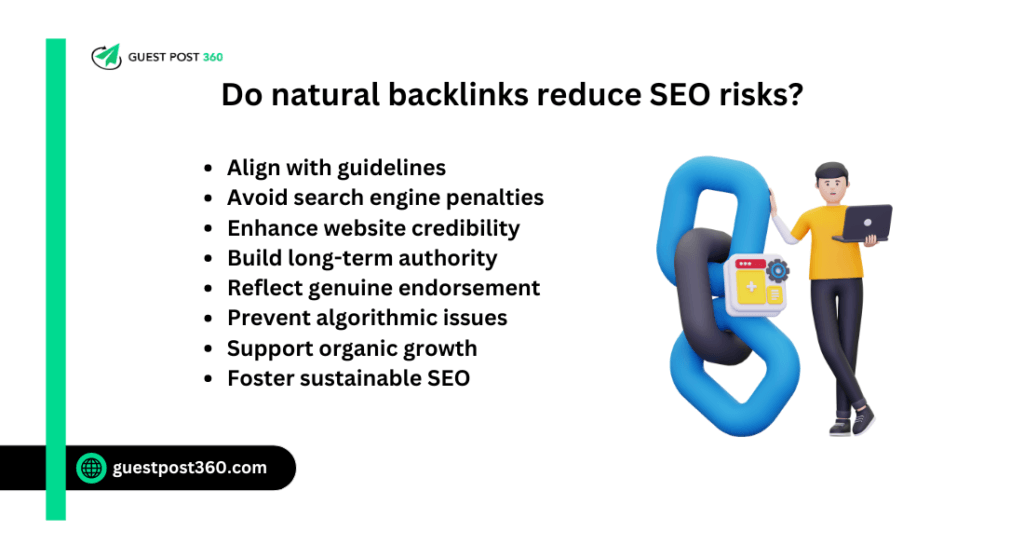

Natural backlinks help minimize the risk of search engine penalties because they are harder to manipulate. Algorithms like Google’s Penguin update specifically target unnatural link-building strategies, such as buying links or participating in link farms. Since natural backlinks occur organically, they don’t raise red flags or lead to penalties that can harm your website’s SEO efforts. Instead, they contribute positively to your site’s credibility and ranking potential.
Another way natural backlinks reduce SEO risks is by promoting a more ethical and sustainable approach to link-building. With natural backlinks, your focus is on creating high-quality content that others want to link to, rather than trying to game the system through questionable practices. This approach ensures that your site maintains its rankings over time without the fear of sudden drops caused by penalties or algorithm updates. It’s a long-term investment in your website’s authority.
Lastly, natural backlinks foster strong relationships with other sites, further reducing risks. When websites link to your content naturally, it often results from mutual respect for quality work. These relationships can lead to further collaboration, guest posting opportunities, and additional backlinks in the future. By avoiding risky shortcuts and focusing on building natural backlinks, you can create a robust and trustworthy SEO foundation for your site.
Can blog comments lead to natural backlinks?
Blog comments can lead to natural backlinks, but only under certain circumstances. When you leave meaningful, thoughtful comments on industry-related blogs, you can build relationships with other content creators and website owners. If your comments add value to the discussion and demonstrate your expertise, you may attract attention that could lead to natural backlinks over time. However, it’s important to note that simply dropping links in blog comments is often seen as spammy and won’t result in high-quality natural backlinks.
For blog comments to effectively lead to natural backlinks, the key is engagement. Instead of focusing on placing links, concentrate on contributing valuable insights or asking relevant questions that encourage a deeper conversation. Over time, the blog owner or other commenters may visit your site to learn more about your expertise. If they find your content helpful, they could link to it in future posts, generating natural backlinks without you having to directly ask for them.
Blog comments can also be a starting point for relationship-building. When you regularly engage with a particular blog’s content, the website owner may start to see you as a trusted voice in the industry. This can lead to opportunities for guest posts, collaborations, or content sharing, all of which can earn you natural backlinks. Building these relationships organically is one of the most effective ways to secure natural backlinks from high-authority sites.
While blog commenting itself doesn’t directly result in natural backlinks, it serves as a networking tool that can open doors to backlink opportunities. The key is to remain patient and authentic in your interactions, as building trust takes time. Ultimately, focusing on genuine engagement and providing valuable input is more likely to lead to long-term benefits, including natural backlinks from other authoritative websites.

